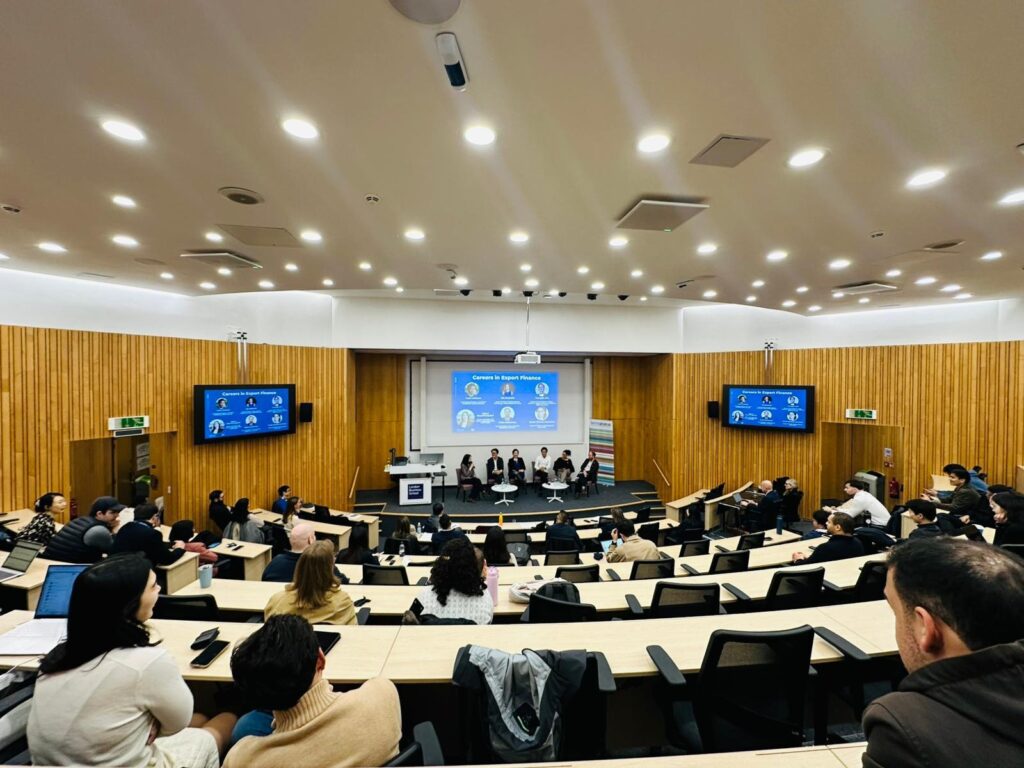By Didem Bayseferogullari, MiFPT2026
The Start of a Journey
August 2024.

The orientation week of the Masters in Finance at London Business School…
It was… entertaining, exciting, engaging, full of insightful discussions and networking opportunities.
Yet, what stayed with me most from that week was something Associate Dean for Degree Education, Graham Hastie, shared: a quote from a poem by Spanish poet Antonio Machado:
“Caminante, no hay camino, se hace camino al andar.”
(Traveler, there is no road; you make your own path as you walk.)
That moment struck me. It made me think about creating something—not just absorbing knowledge, but contributing, building, and opening doors for others. This realisation ultimately led me to organise the first-ever export finance event hosted by a school: “Building Careers in Export Finance: Insights and Networking”, which took place on February 22, 2025.
Hosted by the LBS Finance Club and sponsored by the Berne Union, the event connected industry leaders with aspiring professionals and students.
What follows is a summary of its key highlights.
Creating Access: The Power of This Event

This event was intended to be about more than just introducing export finance—it was also about creating access to opportunities. We brought together industry professionals from export credit agencies, commercial banks, and multilateral organisations (such as the World Bank) to share their insights. Participants had the chance to ask questions, network, and explore how they could pivot into this dynamic sector.
It was eye-opening to see how many people had little to no exposure to this field before the event but walked away with genuine curiosity. Some students were already working in finance but had never considered export finance as a career path or never heard of it. Others were intrigued by the idea of being part of something that fuels global trade, infrastructure, and economic development.
Impact is Not Just a Buzzword: Why Export Finance Matters

For many students, careers in investment or commercial banking, private equity, consulting, or asset management feel like the default paths in finance. But what about those drawn to global trade, mega projects, risk mitigation, and impact-driven finance? Export finance is a critical sector, yet many remain unaware of the career opportunities it offers.
My entry into export finance was also pure coincidence —just like most professionals in this field. When I began working at Turk Eximbank (Turkey’s official Export Credit Agency), I gradually came to understand its role in global trade and economic development.
During his presentation, Prof. Andreas Klasen (Oxford University) shared a striking statistic: 80-90% of world trade relies on trade credit, insurance, or guarantees. This means trade and export finance serve as the lifeblood of international trade.
So, looking at the bigger picture, in times of crisis, when commercial lenders step back due to uncertainty, government-backed export credit agencies (ECAs) or Eximbanks can step in, making trade possible with their guarantees, insurance, and direct lending. This is why export finance is not just a career; it is a sector that keeps economies moving when traditional financing hesitates.
Building Careers in Export Finance

One of the most exciting moments for me was moderating the career panel discussion. The panellists shared three key reasons why they chose to enter—and remain in—this field:
1.Impact – Beyond financial returns, this sector allows professionals to support infrastructure and trade projects that drive economic development and improve people’s lives.
2.Competitive Advantage – As a niche field, export finance provides specialised expertise, enabling professionals to transition between ECAs, commercial banks, brokers, and multilateral organisations with ease.
3.Networking & Community – Export finance is a close-knit industry where professionals not only build strong networks but also feel a true sense of belonging. Relationships matter, and the supportive nature of the industry fosters long-term connections and career growth.
We also explored various pathways into the industry. Many professionals begin their careers in technical roles, gaining deep expertise before transitioning into different organisations within the sector. Regardless of the entry point, the key takeaway was clear: once you are in, the opportunities to grow and evolve are extensive.
Bonus: The Perks of the Job
Export finance is a truly international field. Travelling to project sites, engaging with diverse stakeholders, and attending high-level OECD and global finance meetings are all part of the job. Every panellist highlighted international exposure as one of the most exciting aspects of their careers – the bonus is the travel!
One panellist shared a fascinating story about a project in Africa, where an export finance-backed transaction helped fund a critical infrastructure project that transformed a local community. It was a powerful reminder that this field is about more than numbers—it is about real-world impact.
Advice for Students Interested in Export Finance
- Learn languages – Many deals involve multiple countries and cultures, so language skills are a huge asset.
- Hone your presentation skills – Effective communication is key when dealing with high-level stakeholders.
- Stay curious – Given the evolving nature of global trade and sustainability regulations, staying informed is crucial.
- Get involved in industry events – Conferences and networking events can be great entry points into the field.
- Network! – Relationships drive this industry, so start building connections early.
The Power of the LBS Community

One of the things I appreciate most about LBS is its openness to new ideas. When I proposed the event, the support I received—from LBS Finance Club, Faculty, the Career Centre, and most importantly, my fellow MIFPT2026 students —was remarkable.
We had an incredible turnout, with students and professionals from various programmes and schools showing interest—particularly for such a niche sector. The discussions were candid, insightful, and, most importantly, practical. We covered topics ranging from career entry points to hot topics, such as sustainability in export credits. For many, it was their first exposure to the sector, and it sparked new ambitions.
What stood out the most was the enthusiasm from my peers. Many followed up after the event, eager to learn more, seek career advice, and explore ways to get involved. Some even mentioned that they were considering internships or projects in export finance—something they had never thought of before. That, to me, was the most rewarding part of the entire experience.
Creating Your Own Path
Reflecting on this experience, I encourage anyone considering an unconventional career path: do not wait for a clear route to appear. Take initiative, create opportunities, and trust that the path will take shape as you move forward.
As Machado’s poem says:
“Traveler, there is no road; you make your own path as you walk.”
This quote has stayed with me since my first day at LBS, and it resonates even more now. Sometimes, the most valuable opportunities are the ones we create for ourselves.
The inaugural export finance event at LBS is just the beginning. Who knows what doors it will open next?
